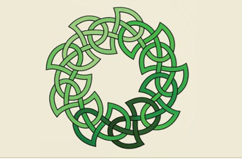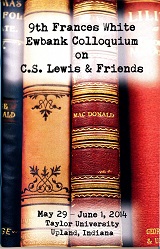Event Title
Paper Session 5-B
Location
Euler 108
Start Date
31-5-2014 3:00 PM
Description
"MALEeldil and Mutual Society: A Modern Woman's Defense of Jane Studdock" - Crystal Hurd
Over the past few decades, many scholars and casual readers have derided C.S. Lewis as a misogynist for the "expulsion" of Susan from Aslan's Country. However, closer examinations of Lewis's underlying philosophy and previous experiences with women lend us exceptional insight into his changing perspective as well as his portrayal of feminine characters. Written before his wildly popular The Chronicles of Narnia, Lewis's science fiction or Ransom trilogy provides a glimpse into his developing talents as a fiction writer but also provides crucial commentary on the gender issues plaguing the twentieth century. This paper will investigate, through his correspondence, fiction, and nonfiction, the origins of Lewis's views on women and marriage in an attempt to redeem Lewis from the scathing sexist criticism he had previously received. Milton's Hierarchical Conception will be discussed, as well as an evolution of the term "Feminism." Finally, Jane Studdock, the flagrantly modern female from That Hideous Strength, will be juxtaposed with the tranquil, enigmatic Green Lady from Perelandra. Equipped with this information, we can better understand how Lewis crafted complex female characters and thus revere Jane Studdock to be thoroughly modern yet humbly obedient.
"The Criteria for Personhood in C. S. Lewis's Out of the Silent Planet" - Mark Satta
What makes one a person in the philosophical sense of the word? What is it that differs between beavers in our world and beavers in Narnia such that beavers are mere animals in the former but persons in the latter? Many philosophers have given accounts of the conditions of personhood. Often the criteria for personhood are put forward explicitly in these accounts on the topic. But I believe there is a philosophy of personhood every bet as rich and detailed as any of these accounts contained implicitly within Lewis's fiction. And one of the richest sources for this account is the first book in the Cosmic Trilogy Out of the Silent Planet. The presentation I propose would examine the features that Ransom recognizes in the séroni, hrossa, pfifltriggi and fellow humans which make them--unlike the other creatures Ransom has encountered--hnau. I argue that it is the features which Ransom identifies as distinctive of hnau that comprise what the criteria of personhood for Lewis.
"Lewis in the Dock (Part 2): A Brief Review of the Secular Media's Coverage of the 50th Anniversary of C.S. Lewis's Death" - Richard James
In 1999, I presented a paper here at this colloquium on the secular print media's response to the 1998 C.S. Lewis Centenary Celebration. In 2014, it seems only natural to do a similar paper on the secular media's coverage of the 50th anniversary of Lewis's death which also included the dedication in Poets' Corner in Westminster Abbey of a memorial stone in his honor. The number of articles again abound, even more than in 1998. This second paper will consider articles by syndicated literary, news and religious columnists from secular newspapers and periodicals; internet postings by public TV and secular cable news websites; print, audio and video coverage by the BBC; plus, one article posted on Aljazeera and another one that is a large multi-color section in a Delaware newspaper. My handout will incorporate all of the internet addresses of these, plus a listing of articles that I will not have time to review in my presentation.
Event Type
Paper
Link to Papers
MALEeldil and Mutual Society: A Modern Woman's Defense of Jane Studdock
The Criteria for Personhood in C. S. Lewis's Out of the Silent Planet (Not available)
Paper Session 5-B
Euler 108
"MALEeldil and Mutual Society: A Modern Woman's Defense of Jane Studdock" - Crystal Hurd
Over the past few decades, many scholars and casual readers have derided C.S. Lewis as a misogynist for the "expulsion" of Susan from Aslan's Country. However, closer examinations of Lewis's underlying philosophy and previous experiences with women lend us exceptional insight into his changing perspective as well as his portrayal of feminine characters. Written before his wildly popular The Chronicles of Narnia, Lewis's science fiction or Ransom trilogy provides a glimpse into his developing talents as a fiction writer but also provides crucial commentary on the gender issues plaguing the twentieth century. This paper will investigate, through his correspondence, fiction, and nonfiction, the origins of Lewis's views on women and marriage in an attempt to redeem Lewis from the scathing sexist criticism he had previously received. Milton's Hierarchical Conception will be discussed, as well as an evolution of the term "Feminism." Finally, Jane Studdock, the flagrantly modern female from That Hideous Strength, will be juxtaposed with the tranquil, enigmatic Green Lady from Perelandra. Equipped with this information, we can better understand how Lewis crafted complex female characters and thus revere Jane Studdock to be thoroughly modern yet humbly obedient.
"The Criteria for Personhood in C. S. Lewis's Out of the Silent Planet" - Mark Satta
What makes one a person in the philosophical sense of the word? What is it that differs between beavers in our world and beavers in Narnia such that beavers are mere animals in the former but persons in the latter? Many philosophers have given accounts of the conditions of personhood. Often the criteria for personhood are put forward explicitly in these accounts on the topic. But I believe there is a philosophy of personhood every bet as rich and detailed as any of these accounts contained implicitly within Lewis's fiction. And one of the richest sources for this account is the first book in the Cosmic Trilogy Out of the Silent Planet. The presentation I propose would examine the features that Ransom recognizes in the séroni, hrossa, pfifltriggi and fellow humans which make them--unlike the other creatures Ransom has encountered--hnau. I argue that it is the features which Ransom identifies as distinctive of hnau that comprise what the criteria of personhood for Lewis.
"Lewis in the Dock (Part 2): A Brief Review of the Secular Media's Coverage of the 50th Anniversary of C.S. Lewis's Death" - Richard James
In 1999, I presented a paper here at this colloquium on the secular print media's response to the 1998 C.S. Lewis Centenary Celebration. In 2014, it seems only natural to do a similar paper on the secular media's coverage of the 50th anniversary of Lewis's death which also included the dedication in Poets' Corner in Westminster Abbey of a memorial stone in his honor. The number of articles again abound, even more than in 1998. This second paper will consider articles by syndicated literary, news and religious columnists from secular newspapers and periodicals; internet postings by public TV and secular cable news websites; print, audio and video coverage by the BBC; plus, one article posted on Aljazeera and another one that is a large multi-color section in a Delaware newspaper. My handout will incorporate all of the internet addresses of these, plus a listing of articles that I will not have time to review in my presentation.


